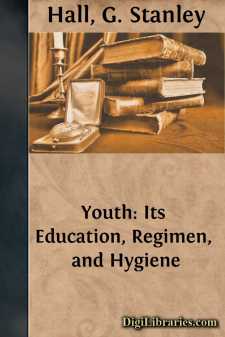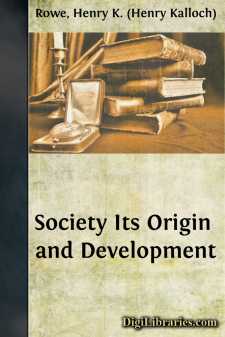Categories
- Antiques & Collectibles 13
- Architecture 36
- Art 48
- Bibles 22
- Biography & Autobiography 813
- Body, Mind & Spirit 142
- Business & Economics 28
- Children's Books 15
- Children's Fiction 12
- Computers 4
- Cooking 94
- Crafts & Hobbies 4
- Drama 346
- Education 46
- Family & Relationships 57
- Fiction 11829
- Games 19
- Gardening 17
- Health & Fitness 34
- History 1377
- House & Home 1
- Humor 147
- Juvenile Fiction 1873
- Juvenile Nonfiction 202
- Language Arts & Disciplines 88
- Law 16
- Literary Collections 686
- Literary Criticism 179
- Mathematics 13
- Medical 41
- Music 40
- Nature 179
- Non-Classifiable 1768
- Performing Arts 7
- Periodicals 1453
- Philosophy 64
- Photography 2
- Poetry 896
- Political Science 203
- Psychology 42
- Reference 154
- Religion 513
- Science 126
- Self-Help 84
- Social Science 81
- Sports & Recreation 34
- Study Aids 3
- Technology & Engineering 59
- Transportation 23
- Travel 463
- True Crime 29
Youth: Its Education, Regimen, and Hygiene
by: G. Stanley Hall
Description:
Excerpt
CHAPTER I
PRE-ADOLESCENCE
Introduction: Characterization of the age from eight to twelve—The era of recapitulating the stages of primitive human development—Life close to nature—The age also for drill, habituation, memory, work and regermination—Adolescence superposed upon this stage of life, but very distinct from it.
The years from about eight to twelve constitute a unique period of human life. The acute stage of teething is passing, the brain has acquired nearly its adult size and weight, health is almost at its best, activity is greater and more varied than it ever was before or ever will be again, and there is peculiar endurance, vitality, and resistance to fatigue. The child develops a life of its own outside the home circle, and its natural interests are never so independent of adult influence. Perception is very acute, and there is great immunity to exposure, danger, accident, as well as to temptation. Reason, true morality, religion, sympathy, love, and esthetic enjoyment are but very slightly developed.
Everything, in short, suggests that this period may represent in the individual what was once for a very protracted and relatively stationary period an age of maturity in the remote ancestors of our race, when the young of our species, who were perhaps pygmoid, shifted for themselves independently of further parental aid. The qualities developed during pre-adolescence are, in the evolutionary history of the race, far older than hereditary traits of body and mind which develop later and which may be compared to a new and higher story built upon our primal nature. Heredity is so far both more stable and more secure. The elements of personality are few, but are well organised on a simple, effective plan. The momentum of these traits inherited from our indefinitely remote ancestors is great, and they are often clearly distinguishable from those to be added later. Thus the boy is father of the man in a new sense, in that his qualities are indefinitely older and existed, well compacted, untold ages before the more distinctly human attributes were developed. Indeed there are a few faint indications of an earlier age node, at about the age of six, as if amid the instabilities of health we could detect signs that this may have been the age of puberty in remote ages of the past. I have also given reasons that lead me to the conclusion that, despite its dominance, the function of sexual maturity and procreative power is peculiarly mobile up and down the age-line independently of many of the qualities usually so closely associated with it, so that much that sex created in the phylum now precedes it in the individual.
Rousseau would leave prepubescent years to nature and to these primal hereditary impulsions and allow the fundamental traits of savagery their fling till twelve. Biological psychology finds many and cogent reasons to confirm this view if only a proper environment could be provided. The child revels in savagery; and if its tribal, predatory, hunting, fishing, fighting, roving, idle, playing proclivities could be indulged in the country and under conditions that now, alas!...







